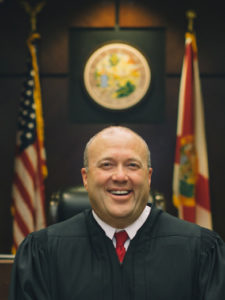Verdicts, appeals and judicial philosophy, even in a pandemic
Ask Judge Smith
 Judge Layne Smith
Judge Layne Smith
Q. Judge Smith, how do judges encourage juries to reach unanimous verdicts? Daniel
A. Courts instruct juries on the law they must follow to decide cases, and sometimes juries are unable to reach a consensus. When jurors become deadlocked, the judge instructs them to identify the sticking points, talk through them, and make a good-faith effort to reach a unanimous verdict. Afterward, if juries can’t reconcile their differences, cases end in mistrials. Mistrials can be retried, dismissed by the prosecutors, or resolved by pleas.
Q. Judge Smith, does the right to counsel extend to appeals? Nancy
A. Yes, the people’s Sixth Amendment right to the assistance of counsel does extend to their appeals. Appellate lawyers read trial records, review evidence, and consider the standards of review, and criminal defendants can challenge perceived errors. Appellate lawyers must balance two duties. First, they must zealously advocate for their clients. Second, as officers of the court, they must not mislead courts regarding the applicable facts or law.
Q. Judge Smith, can indigent criminal defendants pick which assistant public defender will represent them at trial, and what is the standard for “ineffective assistance of counsel?” Jan
A. The Sixth Amendment provides defendants with the right to the assistance of counsel, but it doesn’t provide them with the right to choose which publicly funded lawyer is assigned to their cases. If you think it through, it has to be that way. The elected public defenders and appointed regional conflict counsels throughout the state must manage their staff and budgets. Accordingly, they are responsible for managing their offices and its resources, and they have protocols for assigning lawyers to clients.
Ineffective assistance of counsel happens when a lawyer’s performance was deficient and, but for that deficiency, there’s a reasonable probability the result would’ve been better. This is known as the Strickland standard.
Q. Judge Smith, what is your judicial philosophy and how do you interpret statutes? Joannie.
A. County court is the people’s court. My judicial philosophy is to:
1. Do my homework and be prepared;
2. Follow the law;
3. Respect the separation of powers;
4. Render timely decisions on the merits;
5. Be kind and decent; and
6. Protect victims and the public.
I am a textualist, which means I interpret statutes based on the ordinary meaning of the words the legislature enacted, consistent with appellate decisions.
Q. Judge Smith, how are the courts dealing with the pandemic? Erin
A. The Supreme Court of Florida is carefully balancing our responsibility to keep people safe, with our responsibility to provide justice. Judges are handling essential duties, postponing matters that can be delayed, and conducting civil hearings and trials by telephone and Zoom. Like you, we are all making the best of a tough situation.
The Honorable J. Layne Smith is a Leon County Judge and author of the book “Civics, Law, and Justice—How We Became U.S.” Email your questions to askjudgesmith@gmail.com.








